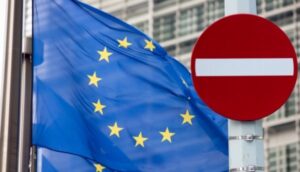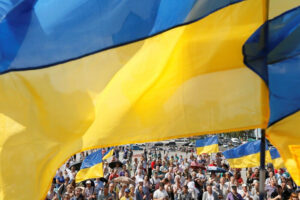
The EU is considering imposing sanctions against dozens of companies from China, Iran, Kazakhstan and Uzbekistan that cooperate with Russia, Reuters reports.
The agency cites diplomatic sources familiar with the European Commission’s draft proposals. Inclusion of these companies in the “black list” is possible within the framework of the prepared 11 package of anti-Russian sanctions.
In late April, Assistant Secretary of the U.S. Treasury Elizabeth Rosenberg during a visit to Kazakhstan warned of the growing risks of secondary sanctions against Kazakh companies and banks that help Russia evade Western sanctions imposed in response to the full-scale war against Ukraine unleashed by Russia.
CHINA, EU, IRAN, KAZAKHSTAN, SANCTIONS, UZBEKISTAN

China will send a special representative for Eurasian affairs to visit Ukraine, the official Xinhua news agency said Wednesday.
“China will send a special representative of the government for Eurasian affairs to visit Ukraine and other countries for in-depth communication with all parties on the political settlement of the Ukrainian crisis,” the agency wrote, citing a telephone conversation between Chinese President Xi Jinping and Ukrainian President Vladimir Zelensky.
Reportedly, Xi Jinping noted that the complex evolution of the “Ukrainian crisis” has a serious impact on the international situation. According to him, the agency reported, China will press for peace and promote negotiations, and will make its own efforts to stop the fighting and cease-fire and restore peace as soon as possible. The Chinese side will send a special representative of the Chinese government for Eurasian affairs to visit other countries as well to conduct in-depth communication with all parties on the political settlement of the “Ukrainian crisis.”
“In the afternoon of April 26, 2023, President Xi Jinping had a telephone conversation with Ukrainian President Volodymyr Zelensky at the initiative of the Ukrainian side. The two sides exchanged views on Sino-Ukrainian relations and the Ukrainian crisis,” the Chinese Foreign Ministry said in a statement.
According to the press service of the Foreign Ministry, Xi Jinping noted that the Sino-Ukrainian relations have passed through 31 years of development and reached the level of strategic partnership, which contributed to the appropriate development of the two countries.
He also noted President Vladimir Zelensky’s “emphasis on the development of China-Ukraine relations and cooperation with China,” and thanked Ukraine for its great assistance in evacuating Chinese citizens last year.
“Mutual respect for sovereignty and territorial integrity is the political foundation of Sino-Ukrainian relations. Both sides should focus on the future, persistently consider and plan bilateral relations in the long term, continue the tradition of mutual respect and sincerity between the two sides and promote the development of the China-Ukraine strategic partnership,” the statement said.
It stressed that “China’s readiness to develop China-Ukraine relations is consistent and clear.”
The Chinese side said that no matter how the international situation changes, China is ready to work with Ukraine to promote mutually beneficial cooperation between the two countries.
“Xi Jinping noted that the complex evolution of the Ukrainian crisis has had a serious impact on the international situation. On the issue of the Ukrainian crisis, China has always stood on the side of peace, and its main position is to promote peace and negotiations,” the Foreign Ministry said.
The ministry recalled their “peace plan,” and added that China is “neither a creator nor a party involved in the Ukrainian crisis.”
“As a permanent member of the UN Security Council and a responsible large country, we will neither watch the fire from the other side nor pour oil on the fire, let alone seize the opportunity to profit,” China said.
It stressed that “dialogue and negotiation are the only possible way out,” there are no winners in a nuclear war, and “all parties concerned must remain calm and restrained in solving the nuclear problem.”
“It is hoped that all parties will think deeply about the Ukrainian crisis and work together to seek a path toward long-term peace and stability in Europe through dialogue. China will insist on establishing peace and facilitating negotiations, and will make its own efforts to stop the war as soon as possible, cease fire and restore peace,” China said.
In addition, the Chinese side will send the Chinese government’s special representative for Eurasian affairs to Ukraine and other countries to conduct in-depth communication with all parties “on the political resolution of the Ukrainian crisis.
China has provided several batches of humanitarian aid to Ukraine and is ready to continue providing assistance within its capabilities.
For his part, Zelensky presented his views on the current crisis in Ukraine, thanked China for its humanitarian aid to Ukraine and welcomed China’s important role in restoring peace and resolving the crisis through diplomacy.

The president of Ukraine has appointed Pavlo Ryabikin as Ambassador Extraordinary and Plenipotentiary of Ukraine to the People’s Republic of China.
According to the official portal of the President of Ukraine, this is enshrined in the decree of the head of state No. 239/2023 of April 26, 2023
From November 2021 to March 2023 Ryabikin was the Minister of Strategic Industries of Ukraine.

In January-March 2023, Ukraine exported 5.3 thousand tons of frozen cattle meat worth $20.6 million.
This is evidenced by the data of the State Customs Service.
The main buyers of Ukrainian frozen cattle meat during the first quarter of this year were China (69%), Azerbaijan (9.8%) and Uzbekistan (7.3%).
Imports of frozen cattle meat during the first three months of 2023 amounted to 369 tons. In monetary terms, it cost Ukraine $1.6 million.
Most of all, Ukraine bought frozen cattle meat in Lithuania (45.1%), Brazil (40.6%) and Austria (13.4%).
As reported, global beef prices rose in March.

Traders are awaiting the release of data from the U.S. Labor Department on the country’s consumer price movements last month, which are considered key to the Federal Reserve’s (Fed) decision on the future direction of monetary policy.
“All markets are clearly focused on the extremely important U.S. inflation data,” notes SPI Asset Management managing partner Stephen Innes, quoted by Market Watch. – Traders are trying to figure out whether the Fed will change course after this data and what the implications for the U.S. economy will be.”
Experts polled by Trading Economics on average expect U.S. inflation in March slowed to 5.2% on an annualized basis from 6% in February.
Higher-than-expected inflation would raise the likelihood of another Fed rate hike by at least another 25 basis points. The U.S. central bank rate hike has already slowed inflation, but it is also holding back the economy. A further rate hike would increase the threat of recession, which would have a negative impact on stock markets, notes Market Watch.
Japan’s Nikkei 225 stock index gained 0.6% in trading.
SoftBank Group shares gained 1.4 percent, Nippon Yusen rose 2.4 percent, Mitsubishi Corp. – by 2.3%, Nippon Steel by 1.8% and Nintendo by 1%.
Bank of Japan data released Wednesday showed the country’s producer price growth slowed to an annualized 7.2% in March from February’s 8.3%. The rate of increase in producer prices last month was the slowest since September 2021.
China’s Shanghai Composite stock index added 0.3 percent in trading, while Hong Kong’s Hang Seng lost 0.8 percent.
The leaders in mainland China are commodities stocks – Petrochina Co. (SPB: 857) gained 3.4 percent, China Petroleum & Chemical Corp. (Sinopec) gained 1.7 percent and Zijin Mining Group Co. – by 0.7%.
Shares of technology giants are becoming cheaper in Hong Kong. Alibaba Group Holding (SPB: BABA) was down 2.4%. On Tuesday, the company unveiled its own artificial intelligence model, a ChatGPT counterpart that works with Chinese and English. The model will be integrated into all business applications in Alibaba’s ecosystem in the near future, the company said.
According to Bloomberg, Chinese authorities are planning to introduce the requirement of safety checks of technologies similar to the popular chatbot ChatGPT.
Shares of Tencent (SPB: 700) Holdings Ltd. fell 4.4% in trading and JD.Com Inc. (SPB: JD) fell 3.4%.
South Korea’s KOSPI stock index is stable in the course of trading, the Australian S&P/ASX 200 added 0.4%.
BHP Group shares rose 2.1%, Rio Tinto – 2.5%, Fortescue Metals – 1.5%.

The overwhelming majority of residents of all regions of Ukraine express a negative attitude towards the Russian Federation, according to the results of a sociological survey conducted by the Razumkov Center sociological service.
“Negative attitude is most often expressed towards Russia (94%), Belarus (81%), Iran (73.5%), China (60%), Hungary (46.5%). Negative attitudes towards Russia are expressed by the vast majority of residents of all regions – from 90% of the eastern region to 97% of the central region,” reads the press release on the results of the survey.
The researchers also specify that 95.5% of those who communicate mainly in Ukrainian at home have a negative attitude towards Russia and 88% of those who communicate in Russian.
At the same time, according to the results of the poll, only 2% of respondents express a positive attitude to citizens of the Russian Federation, 77% express a negative attitude and 14% express a neutral attitude.
“Positive attitude to citizens of Russia is expressed by 4% of residents of the eastern and southern regions, 2% of residents of the central region and 0% of residents of the western region. Negative attitude is expressed by 70%, 56.5%, 80% and 84%, respectively. Among those who communicate primarily in Ukrainian at home, a positive attitude towards citizens of Russia is expressed by 0.6%, among those who communicate in Russian – 5%, negative attitude – 82% and 59.5%, respectively,” – indicate the Razumkov Centre.
In addition, the vast majority (97%) of respondents have a negative attitude towards the government and the Russian State Duma.
At the same time, Ukrainians more often express a positive attitude towards Poland (94%), Great Britain (91%), Lithuania (91%), Estonia (90%), Latvia (90%), Canada (90%) and the Czech Republic (88%), The USA (88%), Netherlands (86%), France (86%), Germany (85%), Moldova (82,5%), Slovakia (82,5%), Israel (75%), Japan (74%), Turkey (72,5%), Georgia (70%), Romania (69%), Armenia (66%), Azerbaijan (65%). The relative majority (46%) have a positive attitude towards India.
The sociological service of the Razumkov Center conducted a sociological survey “Orientations of Ukrainian citizens in foreign policy, assessments of government foreign policy and attitudes toward foreign states and politicians” on February 22 – March 1, 2023, in the framework of MATRA program, financed by the Embassy of the Kingdom of the Netherlands in Ukraine.
The face-to-face survey was conducted in all regions of Ukraine, except for the temporarily occupied territories of Donetsk, Zaporizhzhia, Luhansk, Kharkiv and Kherson regions, Crimea and territories where hostilities are taking place.
Representatives of the Razumkov Center’s social service interviewed 2020 respondents aged 18 years and older. The theoretical sampling error does not exceed 2.3%. At the same time, additional systematic sampling deviations may be due to the consequences of the Russian aggression, in particular, the forced evacuation of millions of citizens.